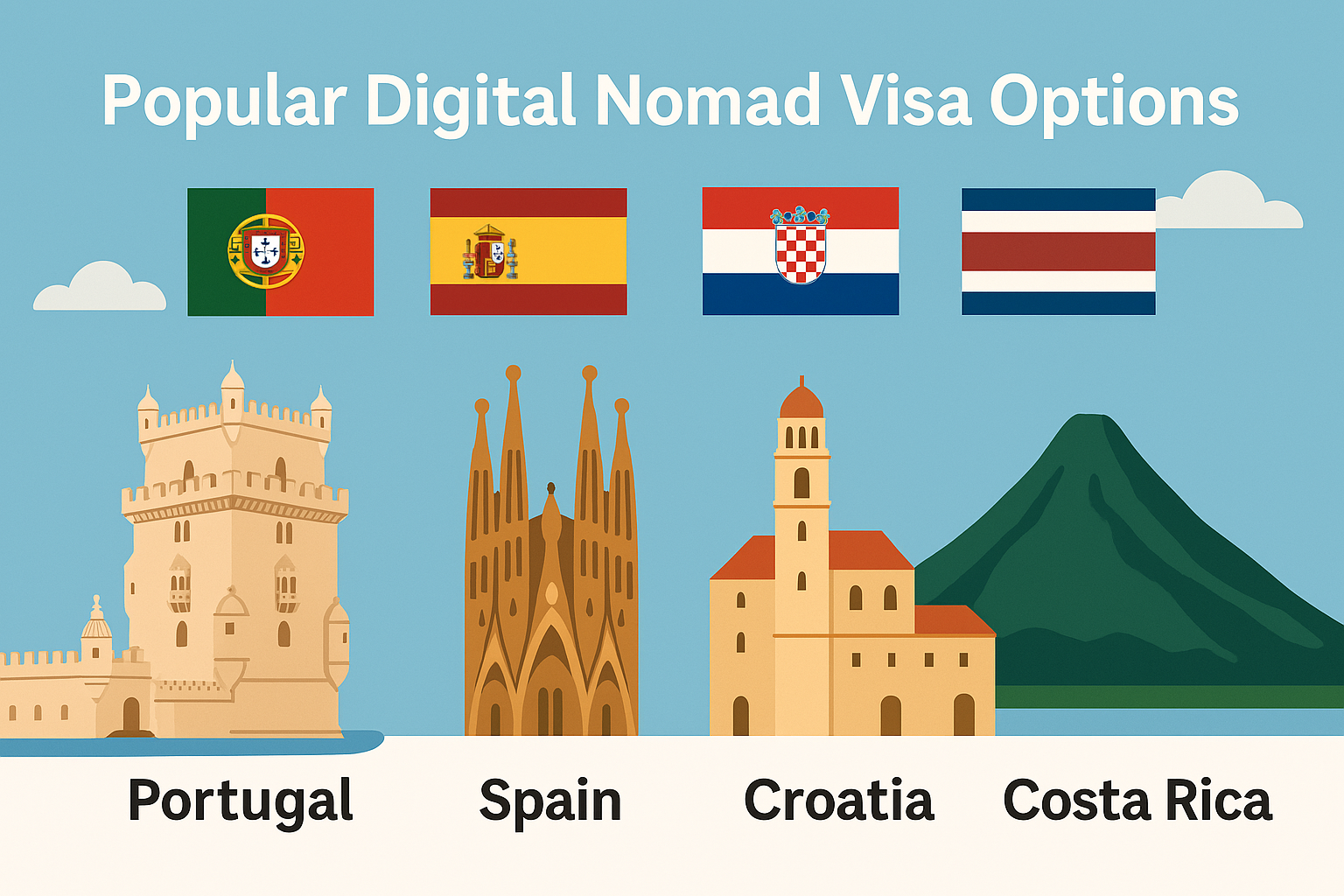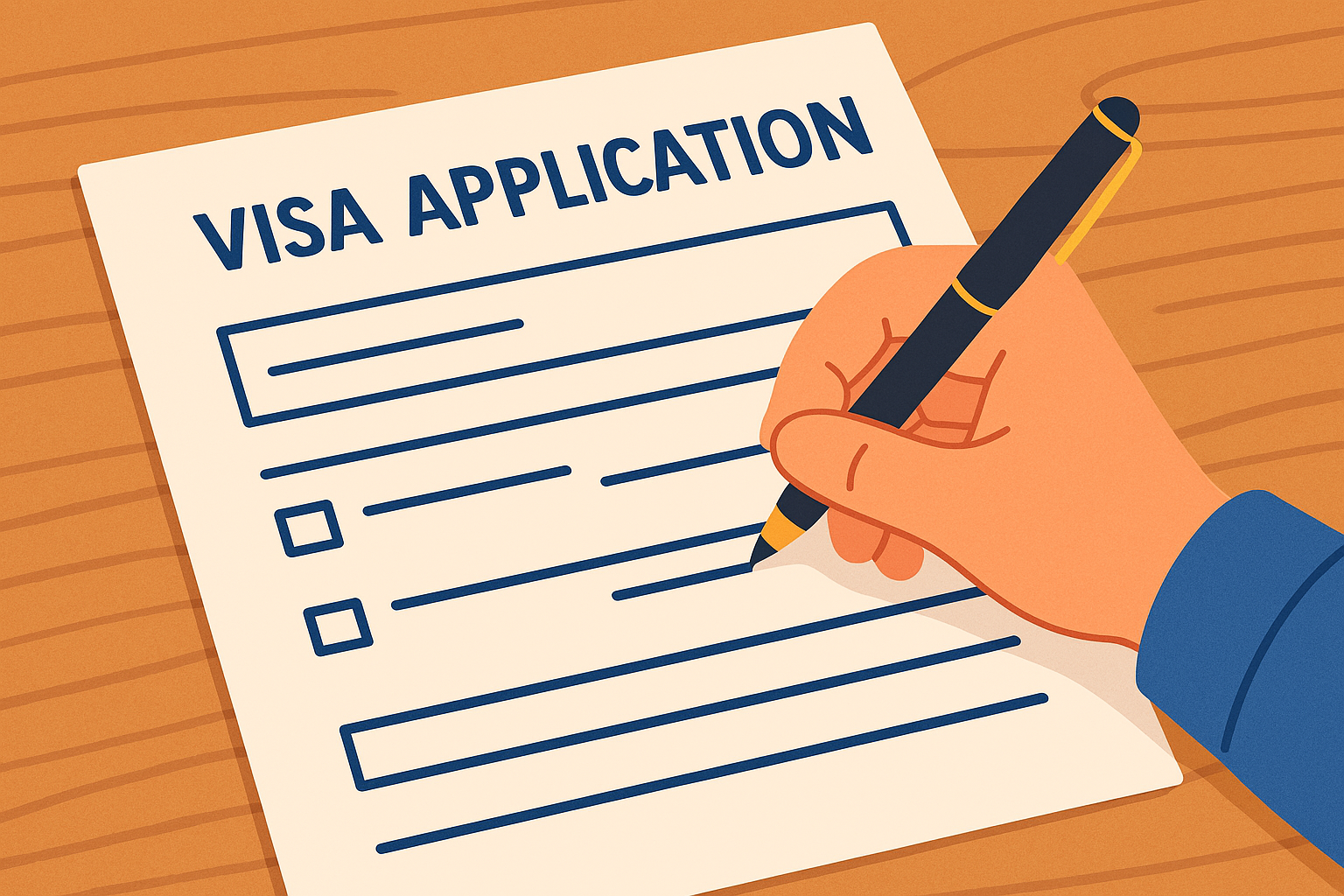You’ve got your passport, your laptop, and a burning desire to explore the world. The problem? Tourist visas often cap you at a month or two, and typical work visas mean getting hired locally. Enter the digital nomad visa—a special permit designed for remote workers who earn their income online, letting you live in a new country for half a year, a year, or even longer without breaking any rules. In this ultimate guide, we’ll explore what digital nomad visas are all about, walk you through common requirements, highlight popular countries, and clue you in on how to apply. Ready to learn how to legally work from anywhere?
I. Introduction
The world has changed dramatically in the last few years—remote work is now a normal way of life for millions. Whether you’re a freelancer, an online marketer, or a remote employee, you can do your job from virtually any spot with a decent internet connection. But while the freedom to hop across borders sounds magical, the logistics can get tricky. Traditional tourist visas aren’t meant for working professionals, and overstaying is a legal nightmare.
That’s where the digital nomad visa comes in. It’s a relatively new concept many countries have rolled out to cater specifically to location-independent workers who want to stay longer than a standard tourist visa allows. If you’ve been itching to experience a new culture without having to leave after 30–90 days, these visas can be your golden ticket. In this article, we’ll cover the basics—what they are, why they matter, popular destinations, and how you can get started on your own digital nomad adventure.
II. What Is a Digital Nomad Visa?

A digital nomad visa is a special type of residency permit that allows you to live in a country while working remotely for clients or employers based elsewhere. Rather than needing to find a local sponsor (like you would for a traditional work permit), you simply need to prove that you earn an income from a non-local source. Think of it as an extended stay visa built for the online workforce.
Key Features of a Digital Nomad Visa:
- Allows longer stays (often 6–24 months) compared to tourist visas
- Designed for remote workers who aren’t employed by local companies
- Minimizes legal gray areas—you’re officially recognized as a non-tourist but not a local employee
- Often requires proof of consistent income and valid health insurance
Internal Link Placeholder:
- How to Start Making Money Online While Traveling — A step-by-step guide to building remote income streams.
III. Why Digital Nomad Visas Are a Game Changer
1. They Remove the Stress of Visa Runs
Remember the hassle of 90-day tourist visas, where you’d have to duck out of the country for a weekend just to reset your stay? Digital nomad visas cut out that stress by granting a legitimate, longer duration.
2. Access to Local Services
With a proper visa, you can sign longer leases, set up local bank accounts (in some countries), and even get access to coworking memberships without worrying about overstaying your welcome.
3. Post-2020 Boom
Remote work went mainstream overnight. Countries recognized the need for official routes that let digital nomads work remotely without inadvertently violating immigration laws.
4. Potential Tax Perks
Depending on local rules, some digital nomad visas come with tax incentives or simplified tax regulations. Always consult a tax professional to see how this affects you.
Affiliate Link Placeholder
- [Insert Affiliate Link Here → Remote Health Insurance]
Many countries require proof of health insurance as part of your visa application. A trusted provider like SafetyWing or Insured Nomads can help. Always check coverage details to match the visa’s requirements.
IV. Typical Requirements to Qualify
While the details vary by country, here’s what you’ll generally need:
- Minimum Monthly Income
Ranging from $1,000 to $4,000 per month, depending on where you’re applying. Some nations are more lenient; others demand higher earnings. - Valid Passport
Make sure it’s valid for at least 6 months beyond your planned stay, but some places require 1 year or more of validity. - Proof of Remote Employment or Online Business
You’ll likely need a letter from your employer (if you’re remote) or documentation showing you own and run a location-independent business. - Health Insurance
A must in almost every digital nomad visa application. This coverage ensures you won’t be a burden on the local healthcare system. - Criminal Record Check
Some countries ask for a police clearance certificate to confirm you have no serious offenses on your record. - Proof of Accommodation
Certain visas require an address where you’ll be staying during your initial weeks or months in the country.
Affiliate Link Placeholder
- [Insert Affiliate Link Here → Online Banking (Wise or Revolut)]
You might need a reliable way to receive and send international payments. Having a multi-currency account can simplify showing proof of remote income.
V. Common Benefits (And What to Expect)
- Legality & Peace of Mind
Working on a tourist visa can cause issues at immigration. A digital nomad visa gives you an official right to work online from the host country. - Longer Stays
Instead of 30 or 90 days, you might get 6 months, 12 months, or even 24 months to truly immerse yourself in local culture. - Better Quality of Life
Many digital nomads pick countries with a lower cost of living or a richer lifestyle (or both!). You can rent a comfortable apartment and avoid the frantic “move every month” approach. - Potential Community
Popular remote-work hubs often have established nomad communities, meetup groups, and networking events, which can help you find friends and business connections faster.
FAQ Section Placeholder
- Can I work for a local company on a digital nomad visa?
Typically no—these visas are designed for remote workers who earn money from outside the country. - Do I pay taxes in that country?
It depends on visa rules and local law. Some places require you to pay local taxes if you stay beyond a certain number of days. Always check official guidelines.
VI. Popular Countries Offering Digital Nomad Visas
Below are some of the big hitters in the digital nomad world, each with its own specific regulations and perks. Click through for detailed guides (once you’ve published them on your blog). Also note the official government resources if you want the most direct info.

- Portugal
Portugal is a remote worker’s dream with its affordable living costs and stunning scenery. The D8 Visa (also known as the Digital Nomad Visa) enables remote workers and freelancers to establish residency by demonstrating a monthly income of at least €3,040 and maintaining savings of at least €36,480.
Portugal Pathways
Quick Facts:
- Income Requirement: Approximately €3,040/month.
- Validity: 1 year, renewable for up to 5 years.
- Why Go?: Mild climate, diverse culture, vibrant expat community.
Internal Link Placeholder: Portugal Digital Nomad Visa Guide
Embassy Link:
Official Portugal Immigration Portal
- Spain
Spain’s Digital Nomad Visa allows remote workers to live in the country for 12 months, with the option to apply for a residence permit, which can be renewed for up to five years. Cities like Barcelona, Valencia, and Madrid have thriving coworking scenes, making it easy to build a network.
Nomads Embassy +1
Business Insider +1
Quick Facts:
- Income Requirement: Approximately €2,334/month (200% of the Spanish minimum wage).
- Validity: 1 year, renewable up to 5 years.
- Why Go?: Incredible food, Mediterranean lifestyle, rich history.
Rippling +19
Global Citizen Solutions +19
Invest in Estonia +19
Internal Link Placeholder: Spain Digital Nomad Visa Guide
Embassy Link:
Government of Spain – Digital Nomad Visa Information
- Estonia
Estonia pioneered the digital nomad concept with its e-Residency program and later introduced a dedicated Digital Nomad Visa. It’s highly tech-forward, which is a plus if you’re into fast Wi-Fi and seamless digital infrastructure.
Quick Facts:
- Income Requirement: Approximately €3,504/month.
- Validity: Up to 12 months.
- Why Go?: Modern infrastructure, vibrant startup scene, minimal red tape.
Internal Link Placeholder: Estonia Digital Nomad Visa Guide
Embassy Link:
Estonia’s Official e-Residency Site
- Costa Rica
Known for its lush rainforests, beaches, and “Pura Vida” mindset, Costa Rica has long been an expat favorite. The Rentista Visa has been around for a while, but newer digital nomad legislation has streamlined requirements.
Quick Facts:
- Income Requirement: $3,000/month for individuals or $4,000/month with dependents.
- Validity: Initially 1 year, can be extended.
- Why Go?: Eco-friendly culture, outdoor adventures, friendly locals.
Citizen Remote +11
Nomads Embassy +11
Nomad Capitalist +11
Internal Link Placeholder: Costa Rica Digital Nomad Visa Guide
Embassy Link:
Migración Costa Rica
- Mexico
Mexico’s Temporary Resident Visa can last from 1 to 4 years, and many digital nomads flock to cities like Mexico City or beach towns like Playa del Carmen. It’s close to the U.S. and offers a vibrant blend of cultures.
Quick Facts:
- Income Requirement: Approximately $1,620/month.
e-Residency
- Validity: 1 year initially, renewable up to 4 years.
- Why Go?: Incredible food, diverse landscapes, relatively easy visa process.
Internal Link Placeholder: Mexico Digital Nomad Visa Guide
Embassy Link:
Instituto Nacional de Migración (INM) Mexico
- Dubai (UAE)
Dubai’s Virtual Work Programme offers remote workers a 1-year stay with zero personal income tax. It’s a city famed for its modern skyline, luxury amenities, and multinational business community.
Quick Facts:
- Income Requirement: Approximately $5,000/month.
- Validity: 1 year, renewable.
- Why Go?: Advanced infrastructure, major travel hub, tax advantages.
Internal Link Placeholder: Dubai Digital Nomad Visa Guide
Embassy Link:
Dubai Virtual Working Programme
VII. How to Apply (Step-by-Step Overview)

While the specifics vary, here’s a general game plan:
- Check Eligibility
Read the official guidelines for your target country. Make sure you meet the income threshold and have all required documentation. - Gather Documents
- Passport (valid well beyond your stay)
- Proof of remote work (employment contract or business registration)
- Bank statements or proof of consistent income
- Insurance policy details
- Criminal record check (if required)
- Submit Your Application
This can be done at the country’s embassy/consulate in your home country, or in some cases, online. Processing times vary from a few weeks to a couple of months. - Receive Approval & Travel
Once approved, head to your destination. You’ll receive a visa sticker in your passport or a digital confirmation code. - Settle In
Arrange housing, get a local SIM or eSIM, and explore the local coworking scene. - Affiliate Link Placeholder: Insert Affiliate Link Here → eSIM (Airalo, Nomad eSIM, Holafly)
- Register Locally (If Needed)
Some countries require you to register with local authorities or get a residency card soon after arrival. Follow those steps to ensure full compliance.
Affiliate Link Placeholder
- [Insert Affiliate Link Here → Visa Assistance Services (iVisa or VisaHQ)]
If you’re unsure about paperwork or translations, these services can streamline the process. Always verify final steps via official government channels.
VIII. Tips to Make the Process Smoother
- Double-Check Visa Length & Renewal Rules
Overstaying can lead to hefty fines or even bans, so mark important dates on your calendar. - Learn Basic Phrases
A little local language goes a long way in showing respect and navigating daily life. - Join Expat & Nomad Groups
Online communities (Facebook groups, Slack channels) offer real-time info on everything from housing to local events. - Prioritize Stable Wi-Fi
If you’re serious about remote work, scope out coworking spaces, cafés, and apartments with reliable internet. Test speeds before committing. - Stay Organized with Documents
Keep digital copies of your passport, visa, insurance, and important contacts handy in case of an emergency.
IX. Things to Watch Out For
- Tax Residency Surprises
In many places, staying over 183 days in a calendar year can trigger tax residency. Confirm the exact rules, and consider talking to a tax pro to avoid unpleasant surprises. - Local Laws & Customs
Respect the local way of life. Some countries have stricter laws around alcohol, dress codes, or personal conduct. - Visa Scams
Beware of third-party sites offering “exclusive” deals. Always cross-reference with the official government site. If something feels off, it probably is. - Fluctuating Requirements
Laws change. A country might adjust its income requirements or add new documents. Check official websites regularly for updates.
X. Final Thoughts
Digital nomad visas are a game changer for anyone who wants to break free from the limitations of tourist visas and truly experience life abroad. They offer longer stays, legal work status, and a chance to immerse yourself in different cultures without the constant worry of overstaying. Whether you’re eyeing a sun-soaked beach in Costa Rica, the cosmopolitan streets of Dubai, or the old-world charm of Portugal, these special visas can give you the stability and legality you need to thrive as a nomad.
Take some time to explore each country’s unique requirements and decide which destination aligns best with your lifestyle and budget. Once you narrow it down, dive into your application process with all the required documents, plenty of research, and a dash of patience. Don’t forget—this journey isn’t just about a stamp in your passport; it’s about experiencing life in a brand-new way.
Internal Link Placeholder:
- How to Make Money as a Nomad – Learn the top online income streams for remote workers.
Thanks for reading, and here’s to living your dream life abroad—legally, comfortably, and with the freedom to keep exploring!
FAQs
- How much do I need to earn to qualify for most digital nomad visas?
Most countries set an income requirement between $1,000 and $4,000 per month, but it varies widely. Portugal’s threshold is on the lower side, while Dubai’s can be higher. - Can I bring my spouse or family on a digital nomad visa?
In many cases, yes. Some countries allow dependents to come with you, although they may need separate applications or extra documents like marriage or birth certificates. - What if I lose my remote job during my stay?
This can complicate your status. Some visas require continuous proof of income. If your financial situation changes, you might need to update local authorities or reapply. - Will I owe taxes in the country I move to?
It depends on the visa terms and how long you stay. Some visas exempt you from local taxes for a specific period. Always consult a tax professional before making big decisions. - Can I switch to another visa while I’m in the country?
Sometimes. If you plan to transition to a full residency or work permit, check with local immigration authorities. Requirements differ, and you might have to leave and re-enter under new terms.
Suggested Affiliate Products in This Article
- Remote Health Insurance: SafetyWing, Insured Nomads
- eSIM Providers: Airalo, Holafly, Nomad eSIM
- Online Banking: Wise, Revolut
- VPN Services: NordVPN, Surfshark
- Travel/Remote Work Gear: [Amazon affiliate links to your favorite digital nomad essentials]
Visa Assistance: iVisa, VisaHQ


